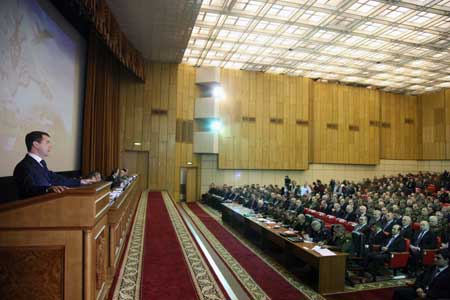Upcoming NATO military exercises in Georgia have rekindled discord that flared up between Russia and the Western defense alliance after the Russians launched a brief war with the former Soviet republic last year.
 |
|
Russia's President Dmitry Medvedev speaks during an annual meeting with the Defence Ministry's staff in Moscow, March 17, 2009. [Xinhua] |
However, an eventual break-up of what some call "a marriage of convenience" seems unlikely as both sides remain keen to repair their ties in order to serve their mutual interests.
Making concessions
Russian President Dmitry Medvedev has called NATO's plan to conduct the exercises in Georgia a "muscle-flexing," "dangerous decision," that could threaten efforts to improve Moscow-NATO relations.
Trying to ease Moscow's fears, NATO has insisted the exercises are not directed against Russia and has invited the country to send observers to monitor the exercises even though it refused to cancel the drills altogether.
"If Russia chooses to send observers, that is something that I think the alliance would look on quite positively, as a way of diminishing possible misunderstandings or concerns," said NATO spokesman James Appathurai.
Even though Moscow has remained silent about the invitation, Russia is not likely to return to full hostility toward NATO, analysts say.
Russia has threatened to boycott the NATO-Russia Council general staff meeting in early May, but it may still attend another two upcoming NRC meetings.
Several Russian media outlets, citing government sources, reported Friday that Foreign Minister Sergei Lavrov was expected to attend an NRC ministerial meeting in Brussels scheduled for May19.
Builing constructive ties
Despite disputes over Georgia and a missile defense system in Eastern Europe, Russia and NATO have been seeking to build constructive ties and seek practical cooperation .
Lavrov has said that Moscow views the alliance as a key factor in Euro-Atlantic security.
The NRC, a forum for direct Russia-NATO dialogue, could become "a constructive basis for cooperation...in the Euro-Atlantic space" if all participants, including the European Union, have the political will, Lavrov said earlier this month.
Russia and some NATO member countries, including Poland, Norway and Turkey, are already planning to establish a radar early warning network that will exchange information on airborne threats.
Polish Defense Minister Bogdan Klich said the network will be headquartered in Warsaw. Klich said he foresees exchanges of radar information between Moscow and the NATO nations.
In return, Russia would provide NATO with its own data on similar threats to the alliance.
Klich said the new project serves as an example of NATO's willingness to re-establish full-fledged ties with Russia.
Dmitry Rogozin, Russia's ambassador to NATO, welcomed the project, calling it a significant contribution to the improvement of Russia-NATO relations.
"This practical cooperation is needed for ensuring the security of our countries and of aircraft passengers," Rogozin said.
Broader Russia-US 'reset' process
Russia's intention to thaw its impasse with NATO is also echoed by its efforts to improve relations with the United States.
Alexander Konovalov, head of the Institute for Strategic Studies, said the improvement of ties with the US-led alliance essentially benefits Russia's "reset" process with the United States.
Russia has high hopes of improving relations with the United States because of the new Obama administration, Konovalov told the RIA Novosti news agency.
"Obama surpassed Russia's expectations in some aspects during the first 100 days (in office)," he said.
Konovalov noted that Obama suggested a reduction of nuclear arsenals and has already set up negotiating teams for a new strategic arms reduction treaty.
Andrei Kortunov, president of the New Eurasia Foundation in Moscow, believes "the current team in Washington will be the best for Russia in the near future."
Russia, Kortunov said, "must use the emerging potential (of bilateral relations) to the maximum."
However, the NATO exercises in Georgia could become the first stumbling block in efforts to "push the reset button" and could create an awkward situation ahead of Obama's first visit to Russia in July.
Meanwhile, NATO's eastward expansion, which Russia considers to be a direct threat, could prove a far more difficult issue for both sides to address.
Lavrov said recently that the conflict in Georgia last August demonstrated just how dangerous NATO's eastward expansion could be.
"It is enough just to imagine what would have happened if Georgia had been a NATO member, as Russia would have still had no other option but to act as it did last August," he said.
(Xinhua News Agency April 26, 2009)